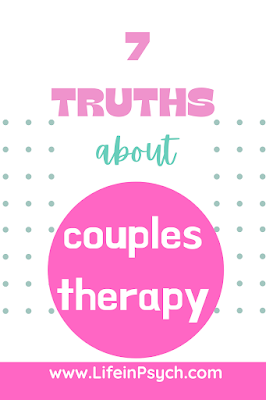Happy Valentine's Day! What a great day to talk about LOVE!
Whether you are single, dating, engaged, or married; love is an emotion that we ALL experience.
SO, since today is Valentine's Day, and we often think about all-things-love-and-relationships, I thought it would be fitting to write about a topic related to love.
I recently participated in a Couple's Therapy class in graduate school- it was fascinating and I wish everyone could take a class like this! Why not share some of my findings from this class!
I titled this post 7 Truths About Couples Therapy, but that is mostly for the clickbait (lol). A more accurate title would be 7 Things that I Learned from My Couples Therapy Class, but that didn't sound as catchy.
I am not an expert in this field, but I hope some of my insights can be helpful if you are interested in studying this topic.
Couple's therapy is an opportunity for couples to work on their relationship with the support of a therapist.
Two models I am referring to in relation to couples therapy is The Gottman Method & Emotional Focused Therapy (EFT). There are not a lot of evidence-based models for couples therapy, so this is a field that still needs more research.
Now that I have told you a little about couple's therapy, here are 7 more things that I learned about Couple's Therapy.
[disclaimer: I am not a couples therapist nor have I been in couples therapy with a licensed mental health therapist. The below points are different facts I learned about giving therapy to partners. This was also only one class, so I have not done extensive research on this topic- this is only information I learned from the course.]
1. Attachment theory
Attachment theory is a major influence in couples therapy (and in mental health therapy in general). Attachment theory looks at the attachment the client had with their guardian as a child.
Parents/guardians who provide a secure attachment create a place where children feel safe. Other attachments are avoidant, anxious, and disorganized. Ideally, we aim to have secure attachments.
The attachment you had as a kid generally carries over to your attachment style as an adult. So, for example, if I had an anxious attachment as a child, it is likely that I have an anxious attachment with my partner- for example, I could have anxiety that my partner is going to leave me. If I had more of an avoidant attachment as a kid, I may avoid confrontation when engaging with my partner or I may even disengage with my partner when strong feelings occur.
Attachment is helpful to know because you can better understand your partner. There is so much more I could talk about in Attachment Theory (I barely scratched the surface), but maybe I can make another post about this topic.
2. What "healthy communication" actually means
I could go on and on about what I've learned in regards to healthy communication between couples. The main idea is that we need to actively listen- not just hearing the words the partner says, but truly trying to listen to the meaning behind the words. The way that I know that my partner is listening is the way he reflects back the content I shared. He also empathizes with me and asks clarifying questions about my situation.
It is one thing to listen, and another thing to show your partner that you are actually listening. This style of communication not only works well with simple conversation, but also important arguments.
The problem that often comes up in couples is when they both allow feelings to build up over time. These problems build up to where bitterness and resentment often occurs. We need to communicate our needs to our partner. If we do not communicate our expectations, they will likely go unmet.
3. It's hard to have a healthy family without a healthy marital relationship
I can foresee a lot of pushback on this statement. Let me explain... It is more likely to see a chaotic family cycle when the parents of the family do not have a healthy relationship. When the parents have a healthy communication and are emotionally connected, it is a lot easier to parent because both parents are (more likely) on the same page.
There are many families who do not understand why their kids are acting a certain way or why their family is falling a part. When the parent relationship is solid, it is easier to work through the difficulties with the rest of the family (kids, grandparents, parents, and relatives).
When it comes to people who are divorced, widowed, or separated... well, the former partners do not have a romantic relationship anymore... so how does this new family system work? In my personal opinion, I think it is still possible to have a healthy family system even if parents are divorced. It helps the children when the parents are friendly and able to communicate. However, this is not going to be the case for every situation (probably most situations if I am being realistic).
Therefore, whoever the guardians are in the family system, they need to have a solid relationship to each other and develop healthy communication skills for not only their own relationship, but also for the sake of the rest of the family.
4. Divorce often stems from emotional detachment
The stereotype is that married partners have a dramatic event that leads to divorce (ex. an affair or an addiction). And although these may be reasons for a couple to divorce, a major reason that the majority of couples separate is because of emotional detachment. When couples lose that commitment to each other, bitterness and resentment often build.
Without the foundation of trust and commitment, it is easy for rest of the building blocks of relationships to fall apart. That is why it is one of the therapist's goals to encourage the secure attachment between the couple.
5. The primary and secondary emotions
A very interesting concept I learned about couple's counseling is that there are often primary and secondary emotions that occur in an argument. The secondary emotions are the ones that are on the surface (ex. feeling angry that my partner criticized the way I drive).
The primary emotions are the ones that the secondary emotions are rooted in (ex. when my partner tells me that I am a bad driver, it makes me feel like I am incompetent of providing in the relationship).
Understanding these emotions helps the couple better understand their own reactions to a situation. The individual can think "why am I really so upset about this". [This concept comes from the EFT perspective].
6. Couple's therapists won't work with couples with severe domestic abuse
Specifically regarding couples counseling, therapists will not work with a couple where there is major domestic abuse (the majority of the time).
Typically, if the therapist discovers the abuse, the therapist will suggest individual counseling for the individuals. In severe cases, therapist will suggest therapy to the survivor, while also suggesting for the survivor to report the abuser.
7. Couples who struggle with emotional detachment are not hopeless... love can be sparked again
It is very typical for couples to go to therapy as a last resort... nothing else worked in their relationship so they are giving it one last try. What is encouraging to me (and hopefully to couples out there) is that there is hope for couples who have lost that "spark".
There are couples who feel like they do not love each other and they feel detached. I could go on and on about the different therapies and activities for couples who have lost this connection (maybe I'll make that another post). But for right now, one thing that I appreciated about my course was learning about the Gottman Card Decks. It is an app where couples can get reconnected through talking about specific topics.
All in all, with work and dedication, many relationships can be restored.







0 Comments